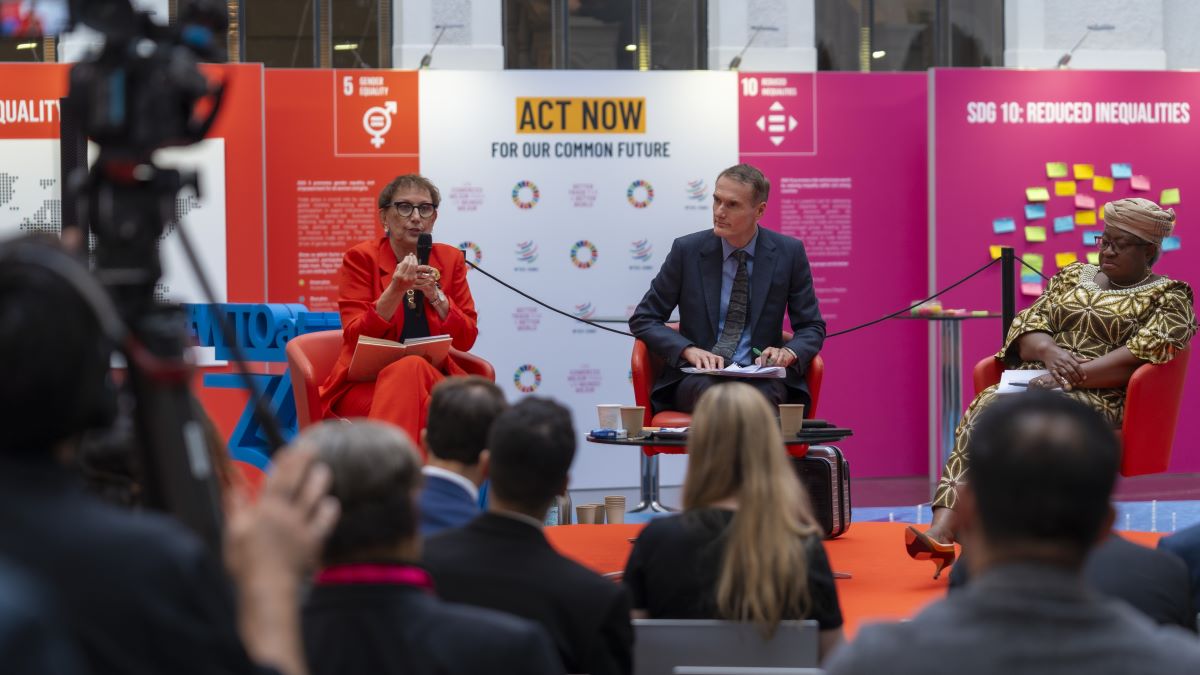Secretary-General Rebeca Grynspan called for reforms to fix trade imbalances that create winners and losers. She emphasized the need to tackle inequalities both within and between countries.
© UN Trade and Development (UNCTAD) | Secretary-General Rebeca Grynspan (left) and World Trade Organization Director-General Ngozi Okonjo-Iweala (right) on 12 September at the Public Forum 2024.
At the World Trade Organization on 12 September, UN Trade and Development (UNCTAD) Secretary-General Rebeca Grynspan emphasized the critical link between peace, sustainable development and a fair global trading system.
She called for reforms to make trade more inclusive and address imbalances that have created winners and losers and left billions of people without fully benefiting from global trade.
Ms. Grynspan made her remarks at the WTO Public Forum 2024, where she joined the organization’s director-general, Ngozi Okonjo-Iweala, for a high-level session entitled “The economic case for inclusivity”.
Tackle inequality within and between countries
The UN Trade and Development chief stressed the importance of tackling inequality both within and between countries. She noted that while redistributing wealth and supporting workers can help fix inequalities within nations, these measures do not address global disparities.
Many developing countries are trapped in cycles of low productivity and economic instability due to their heavy reliance on exporting commodities or other goods with low added value.
For example, 85% of the world's least developed countries (LDCs) are dependent on commodity exports, compared to only 13% of advanced economies.
Similarly, UN Trade and Development’s Productive Capacities Index reveals significant disparities in productive capacities, with developed countries like Denmark, Australia and the United States averaging scores of 70 out of 100, while some African nations, including Chad, Malawi and Niger, score below 20.
The ‘invisible hand’ alone will not correct global disparities
Secretary-General Grynspan said market forces alone, or the “invisible hand”, will not resolve global disparities. She called for deliberate action, such as investing in productive sectors and export infrastructure in developing countries, improving access to technology – especially in digital and renewable sectors – and enhancing access to finance.
The critical minerals market illustrates the need for action. Many developing countries are rich in minerals like copper, lithium, nickel and cobalt, and global demand is set to surge as the world shifts towards cleaner technologies.
The growing demand offers opportunities for these countries to add value to their resources, create jobs and diversify their economies. But this requires sustainable, fair and equitable mining, processing and trading practices. Otherwise, the critical minerals boom could worsen inequalities.
While Ms. Grynspan spoke, the UN Secretary-General’s Panel on Critical Energy Transition Minerals released a report outlining principles to ensure the global energy transition fully benefits all mineral-rich countries and communities. UN Trade and Development leads two of the panel’s workstreams.
The organization also participates in the WTO’s task force on carbon pricing, which seeks to ensure that carbon taxes on imports do not unfairly impact developing countries.
Secretary-General Grynspan reaffirmed UN Trade and Development’s commitment to working with other international bodies to reform trade rules and address commodity dependency, and promote economic diversification and value addition in developing countries.

